For a restaurant entrepreneur, there's nothing more exciting than the launch of a new establishment — but a lot of strategic work has to take place first. What are the latest consumer preferences? What categories are saturated in the local market, and what niches can be profitably filled? What cuisine should you offer, and at what price point?
To answer these questions and develop a strong business plan, you need to know which types of restaurants are most popular and profitable.
Why is it important to understand restaurant types?
Rather than classifying restaurants according to the cuisine they serve — such as seafood, steak, vegan, tapas, or sushi — it may be more useful to look at restaurant categories based on service type and ambience, and how this impacts menu prices. This will be helpful when building out your restaurant business plan.
In full service restaurants, waitstaff assist customers throughout the entire experience, whereas the limited or hybrid service model allows guests to order from a counter, and the food is brought to their table when ready. Quick service is when guests order food from a counter or drive-thru window, and either dine in or get food to go.
The service type you choose for your restaurant is going to greatly impact the type of atmosphere it has. Will it be formal and elegant, eclectic and chic, cozy and homey, or vibrant and fun? What type of furniture will guests sit on, which dishware and cutlery will be used, and what volume will the music be? The atmosphere of the restaurant needs to align thoughtfully with your venue's service type.
Your desired restaurant type will also determine the prices you charge. Are you offering efficiency and convenience to guests looking for a quick and easy bite, or curating a luxurious environment for a destination meal? Based on food, service, and ambience, different types of restaurants can be classified as inexpensive ($), moderate ($$), expensive ($$$), or very expensive ($$$$).
What are the 18 most common types of restaurants?
Arranged by estimated price point, here is an overview of the most common types of restaurants as you consider opening your own.

1. Fast food or quick service
Fast food, or quick service restaurant (QSR) establishments, serve food packaged to be eaten on the go, with menus made up of standardized fare — think burgers, fried chicken, and crispy fries. With a limited set of ingredients, it's easy for fast food restaurateurs to keep costs down, and with much of the food prep done in advance, labor costs are lower as well.
Service type: Counter service or drive-through, limited table service
Atmosphere: Simple, casual
Price point: $
2. Fast casual
Fast casual restaurants are a hybrid of fast food and casual dining, and experts consider this segment to be poised for strong continued growth over time. They offer a more diverse menu selection with slightly higher price points than fast food establishments. But, similar to fast food, these restaurants offer a counter service model where customers place their orders at the cashier and then bring food back to their table. This typically includes popular items like customized salads, signature paninis, smoothie bowls, or burgers and shakes. Like fast food, much of the meal preparation can be done in advance.
Service type: Counter service, limited table service
Atmosphere: Practical, contemporary
Price point: $-$$
3. Buffet
Buffet restaurants are the classic all-you-can-eat establishment, where guests pay for entry and then choose from a wide selection of foods served on long tables or counters. These restaurants can be cost-effective because of their bulk offerings and the fact that customers serve themselves.
Service type: Self-service, limited table service
Atmosphere: Spacious, high-capacity, functional
Price point: $-$$
4. Café or coffee shop
Cafés and coffee shops typically offer a wide range of beverages and smaller menus of pastries, snacks, sandwiches, or other lighter options. Customers may take their orders with them to go, or sit at a table or counter. Cafés serve many needs — they can be a social meeting place, a mobile office, a leisure spot, or simply a convenient place to grab a caffeine boost or a quick bite.
Service type: Counter service or drive-through
Atmosphere: Relaxed
Price point: $-$$
5. Pizzeria
Pizza is big business, and its near-universal popularity includes a wide variety of demographics. The main reason for the profitability of pizzerias is the relatively low cost of ingredients and the straightforward prep process, making pizzerias operations primed for high output. See how Zalat Pizza grew profitably with third-party delivery.
Service type: Counter service and delivery, limited table service
Atmosphere: Simple, cheerful
Price point: $-$$
6. Bakery
A bakery, whether part of a large franchised chain or a smaller local establishment, offers a selection of fresh breads, sandwiches, pastries, and other baked goods. There's no single business model for bakeries, and while perishable inventory, specialized equipment, and long hours can pose challenges, the raw ingredients are cost-effective, predictable, and can be stored for a long time.
Service type: Counter service
Atmosphere: Charming, functional
Price point: $-$$

7. Drink shop
Speciality drink shops serve a wide variety of beverages, such as juices, smoothies, bubble tea, or kombucha. Customers can choose from a variety of ingredients and add-ons to customize orders to their personal preferences. Real estate requirements for these restaurants are typically low, so startup costs are more reasonable and beverage profit margins can be higher.
Service type: Counter service or drive-through
Atmosphere: Contemporary, limited seating
Price point: $-$$
8. Diner
Diners are a well-established type of restaurant where the fare is hearty, easier on the wallet, and efficient to prepare and serve. Diners offer many of the same menu items as fast food establishments, but also feature a welcoming sit-down, eat-in experience with fare normally prepared in-house rather than from prepackaged ingredients.
Service type: Full service
Atmosphere: Retro, classic
Price point: $-$$
9. Bar
Bars can take on many forms, from the local hangout where people get together to watch the big game to a tranquil cocktail lounge that elevates the art of mixology. But the fundamental trait they share is that they are beverage-focused establishments that can yield higher profit margins due to the fact that alcohol offers the potential for the biggest mark-ups in the industry.
Service type: Bar service or limited table service
Atmosphere: Comfortable, thematic
Price point: $-$$$
10. Family style
Family style restaurants generally serve ample portions and encourage sharing. In most cases, waitstaff bring larger menu items to the table and then guests serve themselves — this type of dining experience can be seen in restaurants that specialize in international cuisines such as Italian or Ethiopian. Family style restaurants also make the most of having a kids menu to keep guests of all ages satisfied.
Service type: Full service
Atmosphere: Casual, comfortable
Price point: $$
11. Casual dining
Casual dining establishments encompass a large segment of the restaurant industry, and can range from local independent spots to larger franchises. They can meet the needs of a weeknight meal or a more special occasion. With higher price points than fast food restaurants, casual dining establishments can make more money per dish sold. To learn how one casual dining restaurant transformed its business, see how Smokey Bones drove 288% growth with delivery.
Service type: Full service
Atmosphere: Neutral or quaint, comfortable
Price point: $$

12. Bistro
Bistros are more intimate restaurants that could almost be considered a combination of a cafe and a pub. They serve straightforward but higher-quality meals made in-house, and this means they benefit from both lower startup costs and overhead. Smaller menus — along with small square footage — can be a challenge, but this can also allow flexibility in seasonal offerings.
Service type: Table service
Atmosphere: Trendy, comfortable
Price point: $$
13. Food truck
Food trucks are mobile kitchens that can either change location to seek customers, or stay parked in one defined place. They offer smaller, more specialized menus. Business can fluctuate seasonally based on external factors such as tourist traffic, weather conditions, and festivals or events.
Service type: Counter service
Atmosphere: Varies by location
Price point: $$
14. Ghost kitchen
Ghost kitchens — or virtual restaurants — are a type of restaurant with no storefront at all. Orders are placed by phone or online and are delivery-only. There's no dining room, no host stand, or welcoming bar area. Often, there's not even a sign. Because they consist of little more than a bustling kitchen and a handful of delivery drivers, ghost kitchens have lower costs associated with their operations and can become profitable more quickly than more traditional types of restaurant. Restaurants based in the US can easily roll out a virtual restaurant business expansion with DoorDash.
Service type: Delivery
Atmosphere: Kitchen only
Price point: $$
15. Pub or brewery
Pubs and breweries are similar to bars in terms of potential profitability, due to their primary focus on serving beer and liquor, though their menus of meals and snacks tend to be more expansive. In terms of design and decor, they're generally more informal settings where patrons feel at ease.
Service type: Full or limited service
Atmosphere: Casual, characterful
Price point: $$
16. Contemporary casual
Contemporary casual restaurants emphasize atmosphere and experience, often focusing on popular culinary trends like sustainability, farm-to-table, fusion cuisine, and craft beverages. These restaurants are ahead of the curve on food trends and social media strategies — think of the highly-Instagrammed wine bar in your neighborhood — and attract younger Gen-Z and Millennial diners in droves.
Service type: Full service
Atmosphere: Trendy, photogenic
Price point: $$-$$$
17. Pop-up
Pop-up restaurants occupy a unique niche due to their temporary nature. These ephemeral establishments can be set up in any type of available space, such as a warehouse, a tent, or in another restaurant altogether — and they can be open for a whole season or a single night. Pop-ups draw in consumers through their novelty and an emphasis on experience. Restaurateurs are drawn to the pop-up model because of the latitude to explore new flavors and formats. Because of their temporary nature, pop-ups have fewer of the regular expenses that traditional restaurants have — such as rent or expensive equipment.
Service type: Varies from full service to quick service
Atmosphere: Modular and mobile, highly curated
Price point: $$-$$$$
18. Fine dining
Fine dining restaurants focus on exceptional food and elegant settings. This is the type of establishment where gourmet culinary creations are offered alongside an impressive wine list — often with thoughtful pairings — and guests enjoy service from highly-skilled staff.
Service type: Full service
Atmosphere: Upscale, luxurious, formal
Price point: $$$-$$$$
Why DoorDash is the perfect partner for all types of restaurants
With such a variety of styles, different types of restaurants can try to boost their bottom line in different ways. Some, like quick service restaurants, maintain profitability by focusing on sales volume, while others, like fine dining establishments and bars, drive revenue and profits from markups. But one area where all types of restaurants can drive more sales and serve more customers is with delivery and pickup.

"From my experience with DoorDash, they've been the most supportive of all the delivery platforms. They've definitely gone above and beyond in terms of helping us whenever there's any issues and more so than that, they've helped us a lot in terms of marketing, branding, and getting the word out about Favorites."
DoorDash is a trusted solution designed to help restaurants drive additional sales through easy and efficient delivery. Interested in learning how delivery can boost your restaurant's growth? Get started now.





